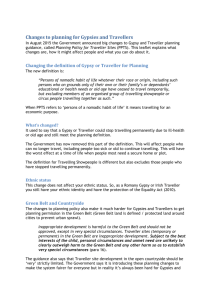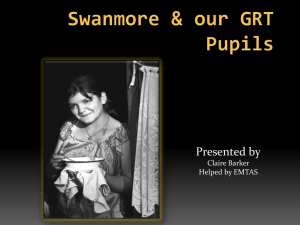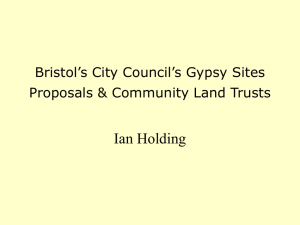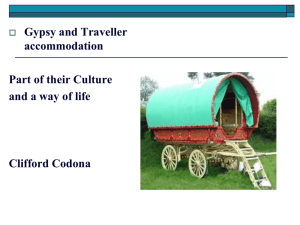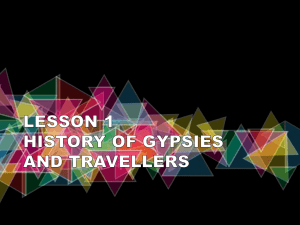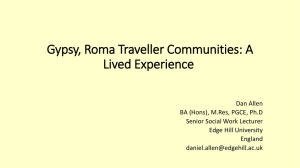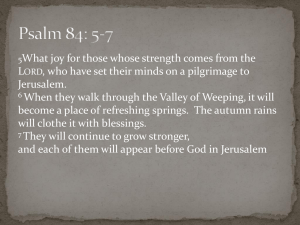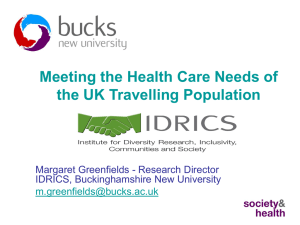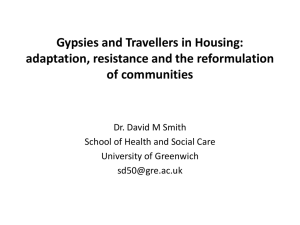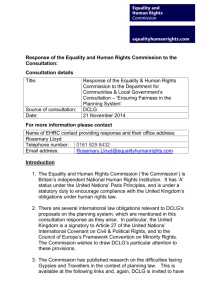useful contacts
advertisement
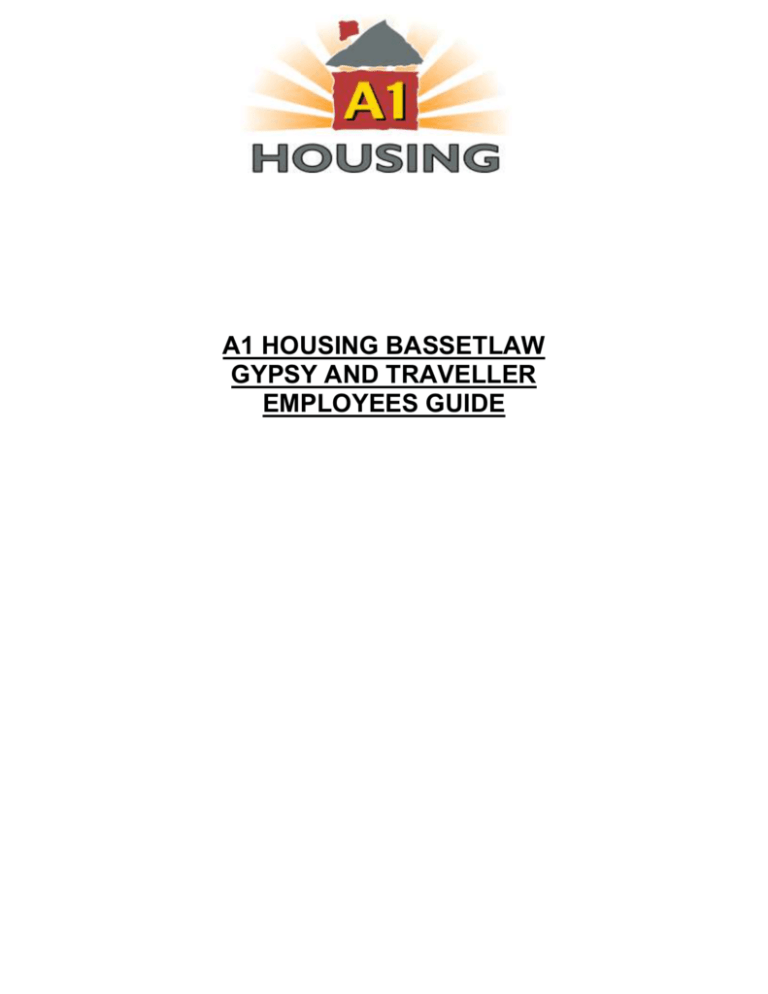
A1 HOUSING BASSETLAW GYPSY AND TRAVELLER EMPLOYEES GUIDE Introduction A1 Housing is committed to ensuring fair access of services to all communities. The gypsy and traveller community is no exception, and is highlighted as a hard to reach group with complex needs and a lack of understanding by many. This document has been written to provide A1 Housing employees and Board Members relevant information about the Gypsy and Travelling communities who may visit Bassetlaw or who already live in or want to settle in one of the properties we manage. It will give employees the confidence in providing the relevant information to offer services to those who are living or looking to settle into Council housing, (also see A1 Housings Equality and Diversity Guidance for Employees). Background information Romany Gypsies and Irish Travellers are legally recognised ethnic groups as they are identified as having a shared culture, language and beliefs. Case law established Gypsies as a recognised ethnic group in 1988 (CRE v Dutton) and Irish Travellers in England and Wales in 2000 (O’Leary v Allied Domecq). No one knows how many Gypsies and Irish Travellers live in England and Wales due to the exclusion of this community as a separate category in the 2001 census. The ethnic status of Gypsy and Travellers has been recognised in the 2011 census. A bi-annual caravan count is carried out but does not produce reliable data. It is estimated that there are between 200,000 and 300,000 Gypsies and Travellers living in the UK. Even though the Gypsy and Traveller culture is traditionally nomadic, 85% live in houses (source: Home Space). When travelling around Bassetlaw you may see Gypsy and Travellers at the side of the road. The reason for this is since 1994 local authorities used to have a legal duty to provide sites for Gypsies and Irish Travellers. This obligation was removed following the Public Order Act and along with a change in the use of land and more land being identified for housing, there are now too few sites to accommodate all Gypsies and Travellers. The lack of permanent and transit sites throughout the country has forced Gypsies and Travellers to camp wherever they can. By parking at the side of the road they are deemed as being “statutory homeless”. Research has determined that to accommodate all the Gypsies and Travellers within the UK they would only need one square mile of land. (source: Home Space 2010). The majority of Gypsies and Irish Travellers live perfectly legally in trailers (caravans) on local authority owned or privately owned sites; many are also living in privately owned or council housing. The shortage of sites for Gypsies and Travellers means that we are left with a situation where thousands of families have nowhere to go – and must either move into housing, camp unlawfully or develop their own land unlawfully. In Bassetlaw, at April 2010 bi-annual caravan count there was 4 encampments, 20 caravans and 9 vehicles. In January 2010, there were 50 pitches available at Danehill Lakes, Stubbing Lane, Markham Moor and Cheapside. Authorised sites (with planning permission) have 21 caravans that are socially rented and 42 privately rented. Unauthorised sites (without planning permission) on land that is owned by Gypsies there are 4 caravans that are tolerated. Due to the fear of increased crime this generates hostility from the local community, which in turn leads to resistance to planning applications – creating a vicious circle by exacerbating the lack of sites. A joined up solution would have a hugely positive impact on race and community relations. In Bassetlaw, from July 2008 to January 2010 the total of caravans has decreased from 89 to 67 (source Nottinghamshire Gypsy and Traveller Accommodation Assessment April 2010). It is virtually impossible for a Gypsy or Traveller to gain planning permission on land they own, and there is a raft of eviction and planning enforcement provisions that effectively criminalise a nomadic existence. It is perceived by the settled community that Gypsies and Travellers are criminals who steal and trespass on other people’s land. The criminal justice agencies do not collect information about Gypsies and Travellers as separate ethnic groups but there is no evidence that offending is any higher among these groups than any others. When there is an unauthorised encampment the fear of crime within the settled community increases. Setting up unauthorised encampments on someone else’s land is not in itself a crime. Either the council (under section 77 of the Criminal Justice and Public Order Act 1994) or the police (under section 61 of the Criminal Justice and Public Order Act 1994) can serve the trespasser with a notice. The occupants of the encampment will only have committed a criminal act if they breach the terms of the notice. National research has demonstrated that Gypsy and Traveller populations are one of the most discriminated against groups in British society. Law in the United Kingdom prohibits discrimination against them, as well as inciting racial hatred towards them. Legal protection from discrimination does exist for Gypsies and Travellers under equality and human rights legislation. Gypsies and Travellers can encounter considerable problems when first trying to make a homeless application. Many Gypsies and Travellers are illiterate or have trouble with literacy. In 2001, the East Nottinghamshire Traveller Association (ENTA) was established as a voluntary support group. It is led by representatives from the Gypsy and Traveller communities and campaigns to challenge discrimination and inequality. The Gypsy Liaison Group is the interagency forum for this service user group and continues to develop links with local agencies. As the largest Gypsy population is located in Newark & Sherwood, there is wider representation for this district, but the Group intends to look at issues affecting Gypsies across Nottinghamshire. Membership includes representatives from the Gypsy and Traveller community, numerous statutory and voluntary organisations who have an interest in their welfare. There are no services specifically for this service user group either as a primary or secondary group. The body which has the most dealings with the Gypsy and Traveller communities is the Traveller Education Service based in Newark. The workers from this service act as the main liaison between Gypsies and other agencies and as such, are involved in many activities, which could be defined as ‘accommodation-related support’. Generally, the Gypsy and Traveller communities have relatively high child numbers, low employment rates, benefit dependency and a high incidence of health need. Public Gypsy and Traveller sites are generally situated in hostile environments and private sites can be the targets of local friction and possible violence. The Supporting People Budget as withdrawn the funding for the Floating Gypsy and Traveller Officer post which supported 25 households. Within the Nottinghamshire area travellers were identified in the following areas: Newark and Sherwood, Rushcliffe, Bassetlaw and Mansfield. The current tenure of Travellers varied from living with parents to living in a Local Authority property. Even when Gypsy and Travellers live in houses their culture and heritage stays with them. A wide range of housing related support needs were identified, from advice/ support, dealing with other agencies, to help accessing culture specific services. Gypsies and Travellers who live in houses may feel particularly vulnerable, especially if they are separated from their extended families and decide to conceal their ethnicity in order to be accepted by the settled community. This has resulted in a high level of suicides and mental health issues (source: Home Space 2010) Those who are open about their ethnicity speak of harassment and intimidation by other tenants. Either way, Gypsies and Travellers living in settled housing may be susceptible to acute stress, leading to another spiral of problems, including substance abuse and depression. Support services are not generally available for Gypsies and Travellers moving from sites to houses. Due to years of suffering discrimination the Gypsy and Traveller community have a fear of “authority”. Other barriers are: Missing appointments because of their culture they have no concept of time. Low literacy levels for Gypsy and Travellers over 30 yrs so they will not understand written information or be able to complete forms. Female Gypsies and Traveller will need to see a female member of staff or be chaperoned. Literacy levels are improving for the under 30-year-olds as Gypsies and Traveller children have a legal right to be educated along with other children. All parents have the same obligation to educate their children as others do. Families facing problems at school will be visited by the Traveller Education Service who will work in partnership with the families and local schools to place children in a school nearby. Although Gypsies and Travellers travel for some of the year (mainly during the summer months to accommodate work patterns), most people need a place to stop during the winter months. Many families prefer to have a safe and secure base from which to travel, this also allows families to access services that other would take for granted eg GP’s, schools, dentist. Gypsies and Travellers will also stop traveling for periods in order to care for sick or elderly relatives and/or children. If a Gypsy and Traveller travel around to various festivals or for work in the summer months they can lose their tenure due to their lifestyle so this restricts their tradition of roaming. Gypsies and Travellers traditionally found work as licensed hawkers or peddlers, basket makers, horse dealers and seasonal agricultural labourers. Today, many Gypsies and Irish Travellers are self-employed as landscape gardeners, tarmacers with others employed as teachers, academics and health workers, whilst others work in the financial sector and in the sport leisure and entertainment industries. Unfortunately, there are no national employment figures, since Gypsies and Travellers are not included in the Labour Force Survey, and no comprehensive research has been conducted in this area. Gypsies and Travellers do pay taxes. All Gypsies and Travellers living on a local authority or privately owned site pay council tax, rent, gas, electricity and all other associated charges. These vary between sites but are often higher than comparable charges for conventional housing. Those living on unauthorised encampments, generally speaking, do not pay council tax rates, but they also do not receive services. This is not because they are avoiding paying the tax, but because encampments need to be in place for one year before tax becomes payable, and most encampments are far more temporary in nature. Even though everyone in the UK is entitled to a health service, whether people are traveling or not Gypsies and Travellers tend not to access mainstream health care services as much as the settled community, this leads to grave health disparities. The reason for this is they won’t admit to have health problems. Levels of prenatal mortality are significantly higher than the nation average. Gypsy and Irish Traveller women live 12 yrs less than women in the general population Gypsy and Irish Traveller men 10 yrs less than men in the general population. Three times more likely to commit suicide A1 Housing Commitment It is important for Board members and employees of A1 Housing to understand the issues facing Gypsies and Travellers who already live or may be looking to come into Bassetlaw for accommodation. A1 Housing is committed to ensuring that the relevant support is offered and organised for the transition to take place from a travelling lifestyle to settled housing. It cannot be taken for granted that travelling communities can be easily identified by an ethnic monitoring form, the company therefore needs to disperse local myths about Gypsies and Travellers to give a general awareness, understanding and acceptance of this section of the community just as we would with any other hard to reach group. The Equality and Diversity Officer has links to the Gypsy Liaison Group who will refer Gypsy and Traveller customers who are having problems accessing our services or neighbour problems as a central contact. However, in the main the first contact will generally be with the Neighbourhood Housing Officers and should be the start of a process, which initiates trust and understanding of issues, which may arise. It is not wrong nor should it be embarrassing to ask questions. It is only through this process we can ensure that all needs are met and any issues are dealt with in the best way possible. Neighbourhood Housing Officers will give support and practical help to ensure that the maximum benefits are accessed, tenancies are maintained and all information is relayed in a format, which suits the needs of this client group. Information and the offer of Tenancy Support should be given to members from this community on sign up stage. Tenant Participation will be an important factor for the Travelling Communities transition, tenants will be encouraged to get involved in any joint meetings and activities organised by ENTA or A1 Housing. All tenants have an invitation to attend the focus group meetings for various services within A1 Housing, dependant on where their interests lie. The Travelling community has equal access to all focus groups and will be actively encouraged to participate in a way which best suits their needs. With this in mind A1 Housing is committed to the principles of the Supporting People Action plan and will: Continue to gather information about the needs of Gypsy/Travellers; Ensure the ‘housing’ related support needs of Gypsy/Traveller communities are catered for; Ensure all new developments specifically consider responses to Black and Minority Ethnic need; Ensure services are responsive to the needs of Black and Minority Ethnic service users; Raise awareness and knowledge amongst employees and tenants about the numbers and needs of Gypsy/Traveller communities. USEFUL CONTACTS Area Housing Offices Head Office 01909 534484 Area Office East 01777 713202 Area Office West 01909 533426 East Notts Traveller Association Plot 16 Sandhill Sconce Tolney Lane Newark Nottinghamshire NG24 1DA Email Address: info@eastnottstraveller.org.uk
